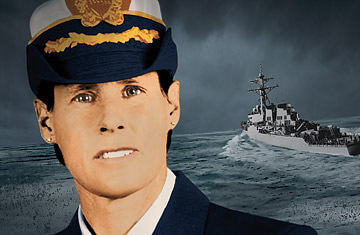
(4 of 5)
Last summer, three crew members privately sought a probe into her handling of the Japan-based Cowpens. In her defense, Graf told investigators that she had "no recollection" of making such comments, and she "appeared incredulous at the accusations." Graf charged that a small group of disgruntled officers were spreading rumors among the crew "and convincing others that the command climate and [her] demeanor were far worse than they actually were." But she followed up with an e-mail. "Many times I raised my tone (and used swear words) to ensure they knew this time, it was no kidding," she wrote. "I also did it on other occasions to intentionally pressurize the situation."
The investigators gave Graf no quarter. Graf violated Navy regulations "by demeaning, humiliating, publicly belittling and verbally assaulting ... subordinates while in command of Cowpens," the report found. Her actions "exceeded the firm methods needed to succeed or even thrive," and her "harsh language and profanity were rarely followed with any instruction." Her repeated criticism of her officers, often in front of lower-ranking crew members, was "contrary to the best interests of the ship and the Navy."
When the 50-page report landed on the desk of Graf's superior, Rear Admiral Kevin Donegan, he relieved her of command.
Was She Singled Out?
The Holly Graf saga has left the Navy facing two uncomfortable questions: Would the Navy have relieved a man for the errors Graf committed? And if Graf's command style was so toxic, how did the Navy miss it in the first place?
The answers are interrelated. Some officers seem to rise magically through the ranks, immune to criticism that would trip up others. Some who watched Graf climb the command ladder assumed she had an ally somewhere that mattered. But that doesn't appear to be the case. Though she came from a family with a long Navy background, she cleared every hurdle the Navy set up for her. Top officers simply didn't pay close enough attention to what happened after that.
So was Graf relieved of her command simply because she is female? "She acted like a man, and now she was being punished for it," says retired commander Darlene Iskra, who in 1990 was the first woman to command a Navy ship, the U.S.S. Opportune, a salvage vessel. But Iskra's view is hard to square with the fact that the service promoted Graf at every turn, gave her two historic assignments and made her something of an example for younger female officers. In fact, Graf was slated for a top Navy staff job at the Pentagon when the IG report scuttled that assignment. More important, the consensus among active and retired Navy officers is that Graf would have suffered the same fate had she been male.
